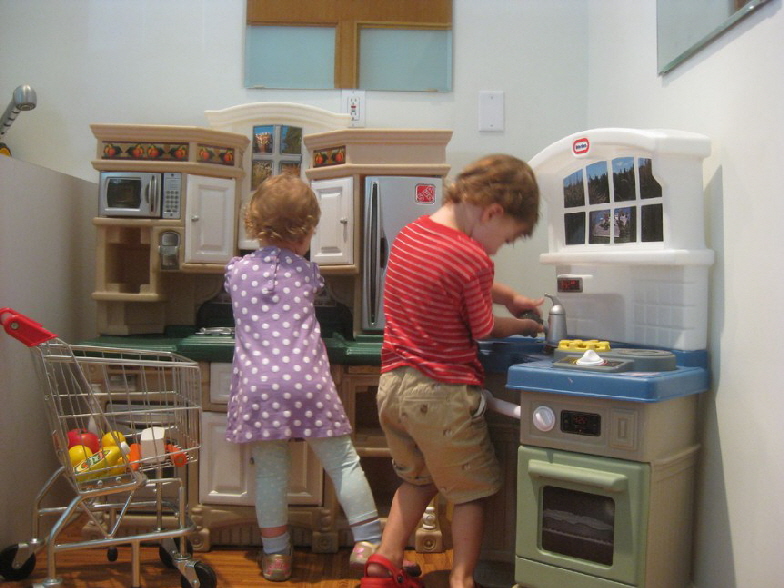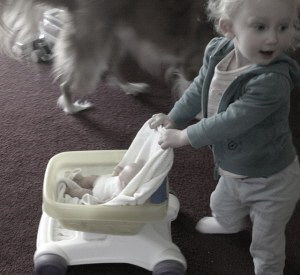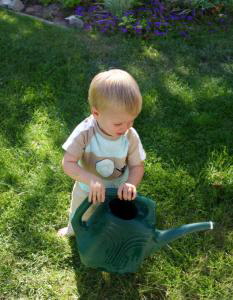|

Playing Mommy Daddy; Dolls For Boys and Girls?
November 3, 2014
There is a lot to being a parent – yes? It’s demanding being responsible for your own life and now the lives of your children. Parenting requires sophisticated and multiple skill sets. Your toddlers are going to give it a try playing “Mommy and Daddy”.
Playing Mommy Daddy, reversing roles for your child, allows them to practice skills like:
- sharing responsibility, cooperating, helping, negotiating
- language
- problem solving
- developing self confidence
- fine motor
- empathy
- sorting out feelings

Expect children around two years old to start imaginary play like “mommy and daddy”. Initially having props that are pretty real will help them get involved in their make-believe game. When they get a little older, they will be able to change the role of a prop in their imagination. A two year old will need a play phone to talk on the phone. A four year old will be happy pretending the banana is a phone. Your child doesn’t need your old cell phone or even a “real” play phone. You can make a perfectly adequate and realistic enough phone with some crayons and cardboard.
Dolls are important. In order to be mom or dad, they are going to need a baby. Again you don’t need an expensive toy doll.
- Realism is important, Leach says. It ought to be clear that the doll represents a person, and not a cartoon or fantasy figure. For infants, this can mean a simple body form made of fabric as well as a plastic baby doll. Children 3 to 5 typically prefer dolls that look like real babies and those with moveable arms and legs that can be posed in different positions.
“The best dolls look realistic but “don’t really do anything,” Leach says. “Dolls that walk and talk take away from what a child can imagine it will do.” Dawn Leach, director of the Austin Community College Children’’s Lab School
Read the entire article at theTexas Child Care Quarterlyfor some great information about dolls. Information on types of dolls, Barbie is not a baby, and how to keep dolls clean and safe. There are instructions in the article for making a doll out of items you probably have around the house.
Google “why it’s important for boys to play with dolls.”. Our boys will be dads – right? So when and where did it become “wrong” for boys to play with dolls? You might have to check your own prejudices and beliefs if your not sure about your young son having a doll.

Sharing Responsibility, cooperating, helping, negotiating: Kids playing mom and dad are going to have the same challenges you, real parents, do. When do we get fed, dressed, ready to market? Who’s cooking and who’s changing the diaper?
Language: They’re learning and practicing saying body parts, clothes, household items and all that every day stuff that is a part of home and parenting. These are fundamental vocabulary items that will help them be confident and informed.
Problem Solving: Just like real parents solve problems to make it all work, your children moms and dads will be working through the logistics of nap or grocery store? Do we have time to shop before lunch? Where are the clean clothes coming from? The crib needs made and baby is sleepy now.
Self Confidence: Language is developing. They’re learning how to take care of their baby and guess what? Baby needs help tying her shoes, getting her meals, bathed. A zipper is a zipper. Children getting their child dressed are learning and practicing skills that they themselves are learning in real life.
Fine Motor: Buttoning, zipping, getting socks on, (is there a doll made that the socks will stay on?), this is all great stuff for developing coordination.
Empathy: Children get to walk a mile, well OK maybe a couple of feet, in your shoes. As mom and dad they are dealing with a baby that is off their schedule, fussy, hungry, tired or crying. Did that doll really just drop his glass of milk. Mommy and Daddy are doing for their baby what the baby can not do herself. Sound familiar? Of course children aren’t going to think about parenting with the cortical ability you have. And still, they are giving these different roles, parent, brother, sister, babysitter, a try.
Sorting out feelings: Role reversal gives your toddler a chance to work through real life situations. Maybe you were a little hurried with her earlier when you were running late to doctor and didn’t exhibit your usual patience and care. Now, with his own baby, your toddler may play the scenario again to get a better understanding of the emotions and energies. You, parents, may hear yourself like you haven’t before. The way your child talks to his baby is modeling behavior he heard from someone.
Have a place and some props for your child to play house. It’s just as important for our little boys to have these experiences as it is for our girls.
- “Why is make-believe play so important? Because in this type of play, children are more creative than when they are being entertained. They make up their own versions of stories; they create their own pretend ideas. They engage in symbolic thinking skills at a higher level than when watching television. Most important, there is growing research that shows make-believe play is related to the development of self-regulation…” Drs. Deborah Leong and Elena Bodrova
 The article, Supporting Make-Believe Play, has great detail on how to facilitate play for different ages, groups and what to look for in an early childhood program. Read the entire article at Tools of The Mind. The article, Supporting Make-Believe Play, has great detail on how to facilitate play for different ages, groups and what to look for in an early childhood program. Read the entire article at Tools of The Mind.
Hopefully it’s obvious that the benefits of imaginary play and especially play as relevant as “mommy daddy” are equally applicable to boys and girls. Developing symbolic thinking is the essence of imaginary play. Acting out roles, talking about, drawing representations of things real and imagined develop your child’s social and creative skills. Exactly the skills that will help them be successful in school and life.
|